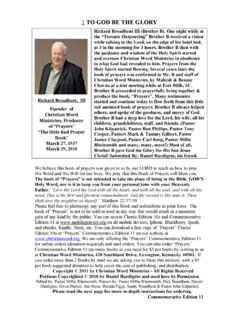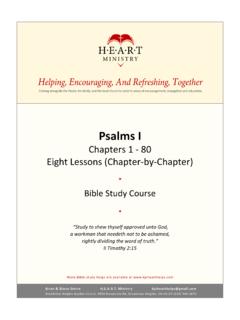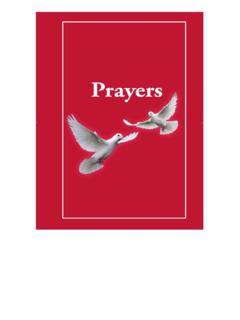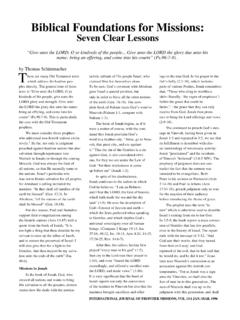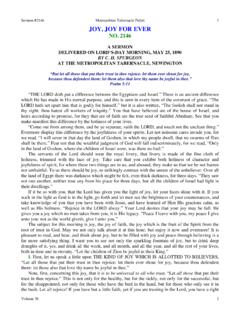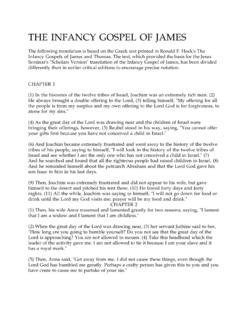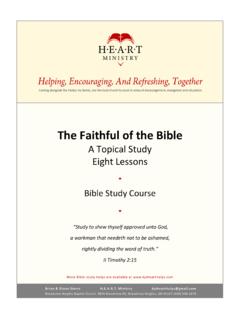Transcription of Genesis 10:1; 11:10, 27, 31, 32; 12:1-4 King James Version ...
1 Genesis 10:1; 11:10, 27, 31, 32; 12:1-4 King James Version October 14, 2018 The International Bible Lesson (Uniform Sunday School Lessons Series) for Sunday, October 14, 2018, is from Genesis 10:1; 11:10, 27, 31, 32; 12:1-4 . Questions for Discussion and Thinking Further follow the verse-by-verse International Bible Lesson Commentary. Study Hints for Discussion and Thinking Further will help with class preparation and in conducting class discussion: these hints are available on the International Bible Lessons Commentary website along with the International Bible Lesson that you may want to read to your class as part of your Bible study. You can discuss each week s commentary and lesson at the International Bible Lesson Forum. ( Genesis 10:1) Now these are the generations of the sons of Noah, Shem, Ham, and Japheth: and unto them were sons born after the flood. Chapter 10 of Genesis presents the genealogy of Noah s three sons prior to chapter 11 that describes the tower of Babel and the scattering of people according to their different languages.
2 From Noah to Abram (Abraham), the family of Noah became seventy nations and millions of people. Abraham descended from Shem. The words Semite and Semitic are derived from Shem and refer to those who speak Semitic languages, especially Arabic and Hebrew Semitic does not apply just to Israelites or Jews. Therefore, technically, to be antisemitic would refer to being prejudiced against both Arabs and Jews. The Christian faith is not antisemitic. As we learned in a previous commentary in this lesson series, Abraham could have easily known both Noah and Shem because of their long lives and the fact that Abraham was one of their direct descendants. P a g e | 2 ( Genesis 11:10) These are the generations of Shem: Shem was an hundred years old, and begat Arphaxad two years after the flood: Shem lived 500 years after the birth of his son Arphaxad. Arphaxad was the grandfather of Eber, from which we get the name Hebrew.
3 Then, Peleg, Reu, Serug, Nahor, Terah, and Abraham descended from Eber. Since Peleg means division for in his days the earth was divided ( Genesis 10:25), the name probably means that the scattering of people according to their languages happened near the time of his birth ( Genesis 11:1-9). ( Genesis 11:27) Now these are the generations of Terah: Terah begat Abram, Nahor, and Haran; and Haran begat Lot. Terah was the son of Nahor and he named one of his sons Nahor. Terah was 70 years old with Abram (Abraham) was born. Terah did not worship the LORD, and that may be one of the reasons the LORD called Abram to leave Haran and go to Canaan (see Joshua 24:2). His son, Nahor, was the grandfather of Rebekah (see Genesis 24:15). Abraham sent his servant to the city of Nahor to find a wife for his son Isaac. ( Genesis 11:31) And Terah took Abram his son, and Lot the son of Haran his son's son, and Sarai his daughter in law, his son Abram's wife; and they went forth with them from Ur of the Chaldees, to go into the land of Canaan; and they came unto Haran, and dwelt there.
4 Haran died in Ur of the Chaldeans. After his death, Terah took Lot, the son of Haran, Abram (Abraham) and Sarai (Sarah) and left for Canaan. Lot would continue Haran s branch of the family. Nahor and his family remained in Ur. When Abram was 75 years old, he took Sarai and Lot to Canaan, leaving Terah in Haran. Lot was an orphan. If Abram did not have children, his nephew Lot could have received an inheritance from Abram. Later, Abraham and Lot separated, and Lot went to live in Sodom and Gomorrah. P a g e | 3 ( Genesis 11:32) And the days of Terah were two hundred and five years: and Terah died in Haran. Despite the fact that Terah s life overlapped the lives of Noah and Shem, Terah turned from the LORD and worshiped idols. Tradition says Terah also made idols. Perhaps to protect Abram and his family from turning away from the LORD to idol worship, in His providence, the LORD called Abram, (Sarai and Lot) to go to the land of Canaan.
5 Terah died in Haran at the age of 205. After the great flood, the lifespan of people decreased. ( Genesis 12:1) Now the LORD had said unto Abram, Get thee out of thy country, and from thy kindred, and from thy father's house, unto a land that I will shew thee: God did not change Abram s name to Abraham until Genesis 17:5. Just as we leave the world behind to follow Jesus Christ in the Kingdom He promised, Abram had to leave his known world behind to go where God would lead him. God taught him how to totally trust in Him for all his needs and future. God also taught him to obey Him always. Abram went to a better land, just as our going to heaven is going to the better place that Jesus has prepared for His followers. The new life and the new world that God has promised through Jesus Christ will be better too. ( Genesis 12:2) And I will make of thee a great nation, and I will bless thee, and make thy name great; and thou shalt be a blessing: God gave Abram good reasons to obey Him by telling him what He would do when Abram left his old world behind.
6 Abram did not know how long he would need to wait for God s promises to be fulfilled or how God would keep them. Abram simply trusted God and obeyed. Abram s faith, though not as mature as it would become, tells us something about Abram s character when God called him. ( Genesis 12:3) And I will bless them that bless thee, and curse him that curseth thee: and in thee shall all families of the earth be blessed. P a g e | 4 Abram would bless others by his faith and obedience. He blessed his nephew, Lot, by giving him sheep and land and later rescuing him from captivity. He blessed the world through many of his descendants, especially Jesus the Messiah. God would bless him, and though we do not learn if any cursed or abused Abram directly, his descendants suffered at the hands of evil people, and God has punished many of those who cursed them. Some especially cursed Jesus, and some still do so.
7 ( Genesis 12:4) So Abram departed, as the LORD had spoken unto him; and Lot went with him: and Abram was seventy and five years old when he departed out of Haran. We are never too old to begin obeying God, though we might have served God better in the strength of our youth. We do not know how much Abram knew about the LORD, but he most probably had the opportunity to learn about the LORD directly from Noah or Shem. We do not know how long he obeyed the LORD before he was seventy-five years old, but the LORD had good reasons for choosing Abram, just as the LORD had good reasons for choosing Noah. After he left Haran, Abram had to wait twenty-five years for the birth of the son God promised (Isaac), and he lived for one hundred and seventy-five years (see Genesis 21:5 and Genesis 25:7). He lived thirty years less than his father Terah. We do not know how long we will need to wait for God to keep some of His promises to us and others or how many years the Lord will enable us to serve Him.
8 Questions for Discussion and Thinking Further 1. Who left Ur of the Chaldeans? 2. Where did they stop? 3. Who went to the land of Canaan? 4. Why did they go there? 5. What did God say about blessing and cursing? P a g e | 5 Begin or close your class by reading the short weekly International Bible Lesson. Visit the International Bible Lessons Forum for Teachers and Students. Copyright 2018 by Parkhurst, Jr. Permission Granted for Not for Profit Use. Contact: Box 1052, Edmond, Oklahoma, 73083 and










